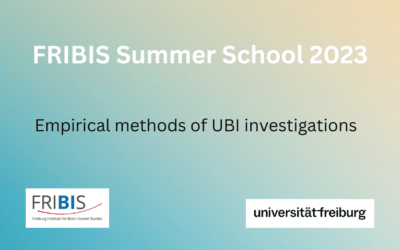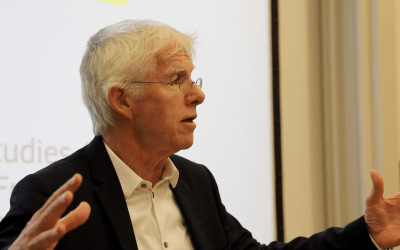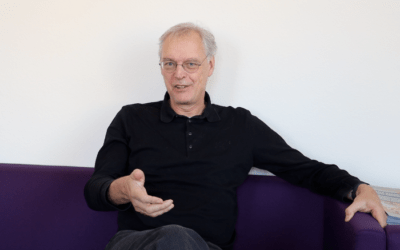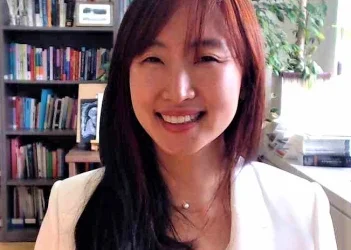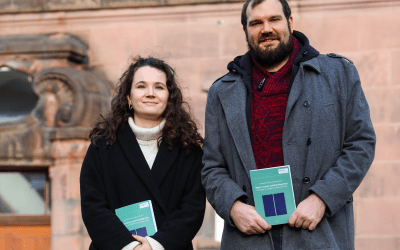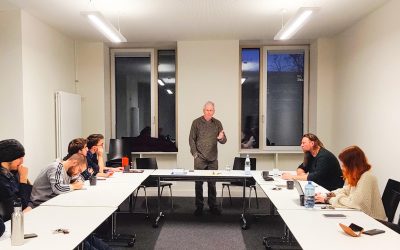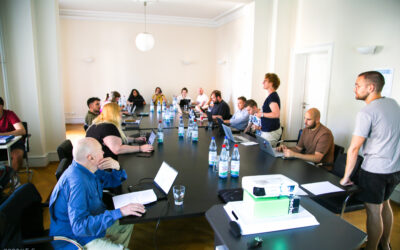Basic Income and Reparations (Nika Soon-Shiong, Liz Fouksman, Richard Wallace & Elise Klein)
Streamed on: March 21, 2024, 06:00-07:30 pm (UK) On March 21, 2024, our four guests, Nika Soon-Shiong, Liz Fouksman, Richard Wallace, and Elise Klein, spoke about the connections between Universal Basic Income (UBI) and the increasing calls for reparations as tools...
WEF-FABI Online Seminar Series: Ubuntu, Social Contracts, UBI, WEF-Nexus, Social Protection, and Empirical Research
Together with our partners at UNAM the WEF-FABI Team will host an online seminar series on “Ubuntu, Social Contracts, UBI, Water-Energy-Food Nexus, Social Protection, and Empirical Research,” starting on 21/03/2024. With assorted guests, the series will create a path...
Publication of two policy papers on the topic of empirical methods in basic income research
FRIBIS is pleased to announce the publication of two policy papers resulting from the discussion and insights of the second part of the FRIBIS Summer School 2023, “Empirical methods of UBI investigation”. The event took place from 11th to 14th April 2023 under the...
Talk by Otto Lehto (NYU), 7th of March 2024: “Universal Basic Income (UBI) as a tool of adaptation and discovery”
In November/December 2021 Otto Lehto, an associate Junior Researcher at FRIBIS, joined us in Freiburg as a visiting researcher at the Götz Werner Chair of Economic Policy and Order Theory. On 7 March 2024, he will be giving a lecture on basic income “as a tool of...
Thomas Straubhaar’s lecture now on YouTube: „Die 3-E des Bedingungslosen Grundeinkommens aus ökonomischer Sicht: einfach, effektiv und effizient”
On 11 January 2024, Prof. em. Dr. Thomas Straubhaar, one of the leading UBI proponents in the economic debate within the German-speaking world, came to Freiburg to give an evening lecture at the invitation of FRIBIS. "Die 3-E des Bedingungslosen Grundeinkommens aus...
Competing perspectives: Bernhard Neumärker and Giacomo Corneo on the basic income on utopia.de
An article published on 30 January 2024 by Utopia.de, a German platform that aims to promote sustainable lifestyles, came up with two opposing positions on the Universal Basic Income. Economists Bernhard Neumärker, Director of FRIBIS, and Giacomo Corneo, Professor of...
Recently published: anthology on ‘future narratives’ of the Universal Basic Income
FRIBIS is pleased to announce the publication of a new anthology: Politische Partizipation und bedingungsloses Grundeinkommen –,Narrative‘ der Zukunft ( Political Participation and Unconditional Basic Income - 'Narratives' of the Future), edited by Leon Hartmann,...
Prof. Sophia Seung-yoon Lee presents her new book and the key concept of “melting labour”
On January 24, Sophia Seung-yoon Lee, Professor of Social Policy at the Department of Social Welfare at Chung-Ang University in Seoul, Korea, presented her new book, Varieties of Precarity. Melting Labor and the Failure to Protect Workers in the Korean Welfare State...
FRIBIS Best Paper Award 2023 for young researchers goes to Franziska Leopold and Tobias Jäger
We are delighted to start the new FRIBIS year with the FRIBIS Best Paper Award. The FRIBIS Board of Directors pays tribute to the PhD candidates, Franziska Leopold and Tobias Jäger, for their excellent contributions to the second FRIBIS Annual Conference (2022) “Basic...
FRIBIS Annual Conference 2023: Care & Gender – Potentials & Risks of UBI
The 3rd annual FRIBIS conference was held in Freiburg from October 9 to 11, 2023. It focused on two often overlooked aspects in the universal basic income (UBI) debate, namely, gender and care as central dimensions of social coexistence. The conference aimed to...
Presentation by Prof. John Davis: Technological Unemployment Creates a New Kind of Collective Property that Can Fund Basic Incomes
Since the industrial revolution, technological innovation has led to loss in Jobs on a grant scale. Until now, at least the same technologies have created different jobs that ultimately offset these losses. But will this trend keep true? Prof. Dr. John Davis thinks it...
Review of the FRIBIS Summer School 2023
In 2023, FRIBIS organised a three-part Summer School on the topic of "Empirical Methods of UBI Investigations". The aim of the series was to establish a platform for practice-oriented basic income research and to provide participants with the opportunity to exchange...


